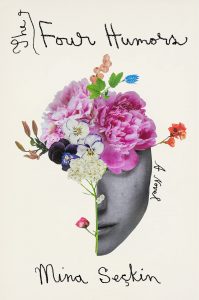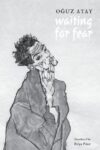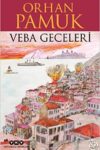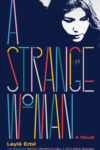
[Catapult; 2021]
In this first novel by Mina Seçkin, a college student from Brooklyn named Sibel recounts a summer in Istanbul, where she intends to prepare for her MCAT exam while touching base with relatives, particularly her ailing grandmother who suffers from Parkinson’s disease. Her American boyfriend Cooper has also come to Turkey, as he is eager to help the family and, he unabashedly assumes, the country.
Sibel wants to care for her grandmother, but she is plagued by health problems of her own — mysterious headaches. She struggles to bring herself to visit the grave of her recently deceased father, who was part of the Turkish diaspora that emigrated to the United States. Her relationship with Cooper experiences youthful convolutions. And her grandmother, a formidable figure, has her own ideas about who is in charge.
The title, The Four Humors, refers to humoral theory, which in various iterations influenced medicine from antiquity until the 19th century. Blood, bile, choler, and phlegm were believed to be the constitutive elements of physical and mental well-being; an imbalance was considered the source of problems. At turns playful and serious, Sibel applies the humors in 21st century contexts to diagnose herself and others:
I used to have a lot to say. I used to be choler: energetic and ambitious. People used to tell me to be quiet, and I would react violently. Now I am listless and tired. I’m phlegm, passive but sensitive, and sentimental. Maybe I am growing up.
One of the narrative challenges for Seçkin in this novel is how to dramatize her listlessness. Sibel acknowledges that at her age, her mother was organizing demonstrations in Istanbul before the 1980 coup. Sibel, in contrast, spends much of her time watching television. “Really,” she admits, “I don’t do anything, but I like knowing that I can do anything.” Later she observes, “I am, after all, a lazy person.” Sibel is self-aware but a little of this phlegmatic description goes a long way. Sometimes she sneaks cigarettes. She and her boyfriend Cooper have their first fight.
Fortunately, a larger story eventually emerges, animated mainly by her grandmother, who shares her past with Sibel. She recounts political turmoil, childbirth, earthquake, kidnapping, attempted suicide, and depression. This is the backdrop of their family history.
Sibel’s parents have roots beyond Istanbul, in other regions of Turkey and Georgia. One of the pleasures of The Four Humors is encountering a multifaceted and complex culture which will be unfamiliar to most Americans, for whom Turkey has been viewed through the limited prism of the Cold War or post 9/11 military adventurism.
Sibel, for her part, acquires a deeper understanding of her heritage, of her family, and of herself. The arrival of her sister Alara, who suffers from a serious eating disorder, provides an additional storyline and new responsibilities for Sibel when Alara’s health deteriorates into a crisis. Secrets — past and present — must be reckoned with. Central to this novel is the problem of what goes unsaid.
Seçkin convincingly dramatizes that this problem has no easy answer. It’s not a matter of simply resisting repression and coming out and saying, because often the truth isn’t reducible to articulable formulas about which everyone will agree. Individuals process and remember events differently. Was Sibel abducted as an infant in Brooklyn, or was it merely an outing for hot dogs? Also, there’s the vexed issue of who has the right to tell. When the grandmother reveals long-withheld facts about their father’s childhood, Alara affirms, “It’s our story [. . .] they should have told us.” Sibel contradicts her: “No, it’s her story.”
It’s hard not to sympathize with both views. Although in recent times there’s been an energetic and sometimes contentious conversation about the risks of cultural appropriation — an issue that is far from being sorted out, to put it mildly — Seçkin adds an interesting nuance by depicting how feelings of appropriation can play out at a more intimate, family level. A number of interested parties lay claim to the story of Sibel’s father. Who has the rights? Who decides?
And, of course, the family dynamic cannot insulate itself from politics in the broader sense. Late in The Four Humors, Sibel’s mother takes her daughters to visit relatives who live four hours away from Istanbul, whose experience is decidedly different from Sibel’s. This is grassroots territory for President Erdoğan and his AK (“Justice and Development”) party. Here, the problems of authoritarianism seem less urgent to people than the benefits of improved infrastructure and growing prosperity.
She could have told us that we were about to meet family members who support the president. We’re used to arguments about Kemalism, capitalism, the military versus the left. She should not have assumed we would know what people think outside our own political bubble. We are Turks who live in New York, of all places, feeling kinship with this country when it is not the country or the nationality that we feel at home with at all, but the people, our family, the things we remember or were told. We don’t have to live under this government.
This political initiation comes in the wake of further revelations from Refika, the woman who actually raised Sibel’s father. As the anecdotes pile up, the novel suffers from a slackness of form. The reader is invited to turn many pages of the family album. Some readers will be more patient than others.
All the while, the shadowy figure of Sibel’s father hovers over the story. He is frequently referred to in Sibel’s self-interrogations. For Sibel, her grandmother’s story was “a gift.” But, she avows, “my father, he did not want to give me the same gift. His feelings remain the only mystery.”
At the same time, it is striking how little Sibel recounts of her own experience with her father. Grandmother’s account is interesting, yes, but Sibel’s shared experience with her father is seldom brought to the page. She returns repeatedly to the immediate circumstances of his death, which she disturbingly witnessed, but one incident, even a regretful one to which a person might have reacted differently, does not define a relationship over a lifetime.
And this reticence becomes a narrative problem, as it is not only a question of Sibel withholding information from her family circle but also from the reader. It is possible to concoct an aesthetic justification for this storytelling gap: it could be read as a revealing lacuna of trauma. As mentioned, it is no simple matter to articulate the past.
But for this reviewer, at least, a greater access to Sibel’s feelings about her father is a missed opportunity. Instead, the narration is diluted by anecdotes which ultimately distract from the novel’s emotional core. The novel is long but leaves a lingering impression of a story that is unfinished.
Charles Holdefer is an American writer based in Brussels. His work has appeared in the New England Review, North American Review, Chicago Quarterly Review, and in the Pushcart Prize anthology. His latest book is AGITPROP FOR BEDTIME (stories) and his next novel, DON’T LOOK AT ME, will be released in 2021. Visit Charles at www.charlesholdefer.com
This post may contain affiliate links.







